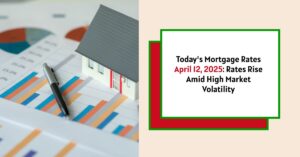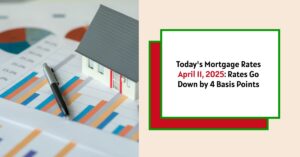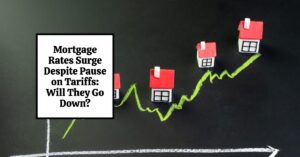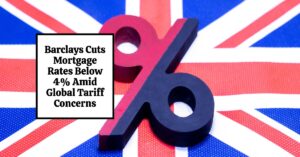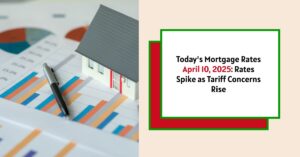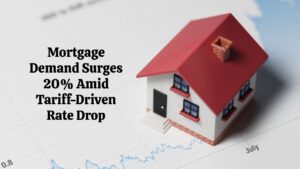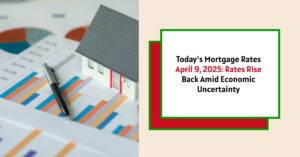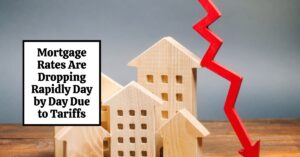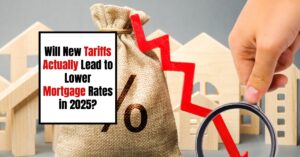As of April 13, 2025, average mortgage rates have increased, with the 30-year fixed mortgage rate now at 6.90% and the 15-year fixed rate at 6.21%. This rise comes amid economic uncertainty and concerns surrounding tariff policies, which could affect future rate changes. Understanding today's mortgage rates can help you make informed decisions whether you're looking to buy a new home or refinance an existing mortgage.
Today's Mortgage Rates April 13, 2025: Rates Rise Sharply by 50 Basis Points
Key Takeaways
- Current Mortgage Rates: The average 30-year fixed rate mortgage is 6.90%, and the 15-year fixed rate is 6.21%.
- Refinance Rates: Today, standard refinance rates for a 30-year fixed mortgage are 6.91%.
- Tariff Effects: Uncertainty in economic policies, particularly tariffs on imports from China, is affecting rates.
- Future Trends: Rates may remain unpredictable due to economic factors.
Understanding Today's Mortgage Rates
Mortgage rates fluctuate based on several factors, including economic policies, inflation rates, and global financial conditions. Today’s rates, as reported by Zillow, indicate notable increases across the board. Here’s a detailed look at the current mortgage and refinance rates.
Current Mortgage Rates (April 13, 2025)
| Mortgage Type | Current Rate (%) |
|---|---|
| 30-year Fixed | 6.90% |
| 20-year Fixed | 6.75% |
| 15-year Fixed | 6.21% |
| 5/1 Adjustable Rate | 7.24% |
| 7/1 Adjustable Rate | 7.38% |
| 30-year VA | 6.46% |
| 15-year VA | 6.01% |
| 5/1 VA | 6.25% |
The average 30-year fixed-rate mortgage, commonly used by homeowners, has seen an increase of 50 basis points since last weekend. Similarly, the 15-year fixed-rate mortgage is up by 49 basis points. These numbers highlight a trend in the rising costs of borrowing money for home purchases.
Current Mortgage Refinance Rates
| Refinance Type | Current Rate (%) |
|---|---|
| 30-year Fixed | 6.91% |
| 20-year Fixed | 6.66% |
| 15-year Fixed | 6.27% |
| 5/1 Adjustable Rate | 6.86% |
| 7/1 Adjustable Rate | 7.27% |
| 30-year VA | 6.62% |
| 15-year VA | 6.26% |
| 5/1 VA | 6.34% |
Refinancing rates are often slightly higher than purchase rates due to various market conditions. It's crucial for potential homeowners or refinancers to shop around for rates and consider their personal financial situations.
The Impact of Recent Tariff Policies on Mortgage Rates
The fluctuations in mortgage rates can be directly tied to economic uncertainties, particularly regarding tariff policies implemented by the U.S. government. As noted in recent analyses, even though President Trump has paused new tariffs on many countries, high tariffs on China remain in effect. These tariffs contribute to economic unpredictability, which in turn influences interest rates.
Experts predict that these tariff-induced fluctuations may continue for some time. As investors react to shifting economic policies, the demand for U.S. Treasuries can cause yield rates, which are closely linked to mortgage rates, to fluctuate.
Despite the current uptick, looking back at historical data can provide insight into how rates have evolved. For instance, as noted by Freddie Mac, the average mortgage rate had previously trended down under 7% for several consecutive weeks leading up to this period. However, the recent rise has caught many potential homebuyers off guard.
Long-term forecasting efforts suggest that if inflation remains stable, rates might decline slightly later in the year. However, should tariff pressures lead to increased inflation, further rises in mortgage rates could occur.
Read More:
Mortgage Rates Trends as of April 12, 2025
Tariffs Push Mortgage Rates Down But Housing Costs Remain Record High
Mortgage Rates Likely to Go Down in the Short Term Due to Tariffs
Adjustable-Rate Mortgages vs. Fixed-Rate Mortgages
Choosing between a fixed-rate and an adjustable-rate mortgage (ARM) is a significant decision for homebuyers. Here’s a breakdown of the differences:
- Fixed-Rate Mortgages: These mortgages lock in an interest rate for the entire duration of the loan, offering stable monthly payments. They are often favored by buyers who plan to stay in their homes long-term and want predictability in their financial obligations.
- Adjustable-Rate Mortgages (ARMs): These loans typically start with lower interest rates for an initial period (e.g., 5 or 7 years) before adjusting annually based on market conditions. ARMs can be great for those who plan to move or refinance before the adjustment period starts, but they do carry risks if the rates rise significantly.
It's essential to weigh both options carefully based on your financial situation, current market conditions, and your plans for homeownership.
Calculating Mortgage Payments
To illustrate how today's rates might affect prospective homebuyers, let’s look at an example.
Example Calculation for a $300,000 Mortgage:
- 30-Year Fixed at 6.90%:
- Monthly Payment: Approximately $1,976
- Total Interest Paid Over Loan Term: Approximately $411,288
- 15-Year Fixed at 6.21%:
- Monthly Payment: Approximately $2,566
- Total Interest Paid Over Loan Term: Approximately $161,382
The differences in total interest paid reflect how mortgage terms can significantly impact financial outcomes over time.
Summary:
Understanding today’s mortgage rates is crucial for anyone looking to buy or refinance a home. With current average rates sitting at 6.90% for 30-year fixed mortgages and 6.21% for 15-year fixed mortgages, these numbers indicate a challenging landscape for homebuyers seeking the best deals.
As tariffs and inflation continue to create volatility in the market, it’s essential to stay informed about how these factors can affect mortgage rates. If you're considering purchasing a home or refinancing an existing mortgage, reviewing your financial situation and consulting with lenders will help you navigate this unpredictable time effectively.
Frequently Asked Questions (FAQs)
Q1: What is the current average mortgage rate for a 30-year fixed mortgage?
A1: As of April 13, 2025, the average rate for a 30-year fixed mortgage is 6.90%.
Q2: How do refinance rates today compare to purchasing rates?
A2: As of today, refinance rates tend to be slightly higher than purchasing rates. For example, the refinance rate for a 30-year fixed mortgage is 6.91%, while the purchase rate is 6.90%.
Q3: Why are mortgage rates increasing?
A3: Mortgage rates are increasing due to economic uncertainty, particularly related to tariff policies that affect inflation and investors' perceptions of risk in the market.
Q4: What factors should I consider when choosing between a fixed-rate and an adjustable-rate mortgage?
A4: Consider how long you plan to stay in your home, your comfort with potential rate fluctuations, and your overall financial situation. Fixed rates provide stability, while ARMs can offer lower initial payments but carry risks of rising rates.
Q5: How can I estimate my monthly mortgage payments?
A5: You can use various online mortgage calculators that take into account the loan amount, interest rate, loan term, property taxes, and homeowner's insurance for a more accurate monthly payment estimate.
Work With Norada, Your Trusted Source for
Real Estate Investment in the U.S.
Investing in turnkey real estate can help you secure consistent returns with fluctuating mortgage rates.
Expand your portfolio confidently, even in a shifting interest rate environment.
Speak with our expert investment counselors (No Obligation):
(800) 611-3060
Also Read:
- Will Mortgage Rates Go Down in 2025: Morgan Stanley's Forecast
- Expect High Mortgage Rates Until 2026: Fannie Mae's 2-Year Forecast
- Mortgage Rate Predictions 2025 from 4 Leading Housing Experts
- Mortgage Rates Forecast for the Next 3 Years: 2025 to 2027
- 30-Year Mortgage Rate Forecast for the Next 5 Years
- 15-Year Mortgage Rate Forecast for the Next 5 Years
- Why Are Mortgage Rates Going Up in 2025: Will Rates Drop?
- Why Are Mortgage Rates So High and Predictions for 2025
- Will Mortgage Rates Ever Be 3% Again in the Future?
- Mortgage Rates Predictions for Next 2 Years
- Mortgage Rate Predictions for Next 5 Years
- Mortgage Rate Predictions: Why 2% and 3% Rates are Out of Reach
- How Lower Mortgage Rates Can Save You Thousands?
- How to Get a Low Mortgage Interest Rate?
- Will Mortgage Rates Ever Be 4% Again?

